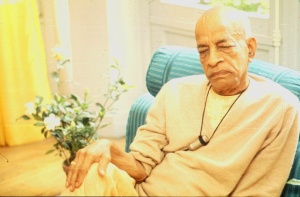SB 7.1.14-15: Difference between revisions
m (1 revision(s)) |
(Vanibot #0018 edit: make synonym terms in Sanskrit italic in SB - Vanisource) |
||
| Line 1: | Line 1: | ||
{{info | {{info | ||
|speaker= | |speaker=Śukadeva Gosvāmī | ||
|listener=King | |listener=King Parīkṣit | ||
}} | }} | ||
[[Category:Srimad-Bhagavatam - Canto 07 Chapter 01]] | |||
[[Category:Bhagavatam Verses Spoken by Sukadeva Gosvami - Vanisource|070114]] | |||
<div style="float:left">'''[[Srimad-Bhagavatam]] - [[SB 7|Seventh Canto]] - [[SB 7.1: The Supreme Lord Is Equal to Everyone|Chapter 1: The Supreme Lord Is Equal to Everyone]]'''</div> | |||
<div style="float:right">[[File:Go-previous.png|link=SB 7.1.13]] '''[[SB 7.1.13]] - [[SB 7.1.16]]''' [[File:Go-next.png|link=SB 7.1.16]]</div> | |||
{{RandomImage}} | |||
==== TEXTS 14-15 ==== | ==== TEXTS 14-15 ==== | ||
<div | <div class="verse"> | ||
dṛṣṭvā mahādbhutaṁ rājā | :dṛṣṭvā mahādbhutaṁ rājā | ||
rājasūye mahā-kratau | :rājasūye mahā-kratau | ||
vāsudeve bhagavati | :vāsudeve bhagavati | ||
sāyujyaṁ cedibhū-bhujaḥ | :sāyujyaṁ cedibhū-bhujaḥ | ||
tatrāsīnaṁ sura-ṛṣiṁ | |||
rājā pāṇḍu-sutaḥ kratau | :tatrāsīnaṁ sura-ṛṣiṁ | ||
papraccha vismita-manā | :rājā pāṇḍu-sutaḥ kratau | ||
munīnāṁ śṛṇvatām idam | :papraccha vismita-manā | ||
:munīnāṁ śṛṇvatām idam | |||
</div> | </div> | ||
| Line 21: | Line 27: | ||
==== SYNONYMS ==== | ==== SYNONYMS ==== | ||
<div | <div class="synonyms"> | ||
''dṛṣṭvā''—after seeing; ''mahā-adbhutam''—greatly wonderful; ''rājā''—the King; ''rājasūye''—called Rājasūya; ''mahā-kratau''—at the great sacrifice; ''vāsudeve''—into Vāsudeva; ''bhagavati''—the Personality of Godhead; ''sāyujyam''—merging; ''cedibhū-bhujaḥ''—of Śiśupāla, the King of Cedi; ''tatra''—there; ''āsīnam''—seated; ''sura-ṛṣim''—Nārada Muni; ''rājā''—the King; ''pāṇḍu-sutaḥ''—Yudhiṣṭhira, the son of Pāṇḍu; ''kratau''—at the sacrifice; ''papraccha''—asked; ''vismita-manāḥ''—being struck with wonder; ''munīnām''—in the presence of the sages; ''śṛṇvatām''—listening; ''idam''—this. | |||
</div> | </div> | ||
| Line 28: | Line 34: | ||
==== TRANSLATION ==== | ==== TRANSLATION ==== | ||
<div | <div class="translation"> | ||
O King, at the Rājasūya sacrifice, Mahārāja Yudhiṣṭhira, the son of Mahārāja Pāṇḍu, personally saw Śiśupāla merge into the body of the Supreme Lord, Kṛṣṇa. Therefore, struck with wonder, he inquired about the reason for this from the great sage Nārada, who was seated there. While he inquired, all the sages present also heard him ask his question. | O King, at the Rājasūya sacrifice, Mahārāja Yudhiṣṭhira, the son of Mahārāja Pāṇḍu, personally saw Śiśupāla merge into the body of the Supreme Lord, Kṛṣṇa. Therefore, struck with wonder, he inquired about the reason for this from the great sage Nārada, who was seated there. While he inquired, all the sages present also heard him ask his question. | ||
</div> | </div> | ||
__NOTOC__ | |||
<div style="float:right; clear:both;">[[File:Go-previous.png|link=SB 7.1.13]] '''[[SB 7.1.13]] - [[SB 7.1.16]]''' [[File:Go-next.png|link=SB 7.1.16]]</div> | |||
__NOTOC__ | |||
__NOEDITSECTION__ | |||
Revision as of 04:18, 1 December 2017

A.C. Bhaktivedanta Swami Prabhupada
TEXTS 14-15
- dṛṣṭvā mahādbhutaṁ rājā
- rājasūye mahā-kratau
- vāsudeve bhagavati
- sāyujyaṁ cedibhū-bhujaḥ
- tatrāsīnaṁ sura-ṛṣiṁ
- rājā pāṇḍu-sutaḥ kratau
- papraccha vismita-manā
- munīnāṁ śṛṇvatām idam
SYNONYMS
dṛṣṭvā—after seeing; mahā-adbhutam—greatly wonderful; rājā—the King; rājasūye—called Rājasūya; mahā-kratau—at the great sacrifice; vāsudeve—into Vāsudeva; bhagavati—the Personality of Godhead; sāyujyam—merging; cedibhū-bhujaḥ—of Śiśupāla, the King of Cedi; tatra—there; āsīnam—seated; sura-ṛṣim—Nārada Muni; rājā—the King; pāṇḍu-sutaḥ—Yudhiṣṭhira, the son of Pāṇḍu; kratau—at the sacrifice; papraccha—asked; vismita-manāḥ—being struck with wonder; munīnām—in the presence of the sages; śṛṇvatām—listening; idam—this.
TRANSLATION
O King, at the Rājasūya sacrifice, Mahārāja Yudhiṣṭhira, the son of Mahārāja Pāṇḍu, personally saw Śiśupāla merge into the body of the Supreme Lord, Kṛṣṇa. Therefore, struck with wonder, he inquired about the reason for this from the great sage Nārada, who was seated there. While he inquired, all the sages present also heard him ask his question.